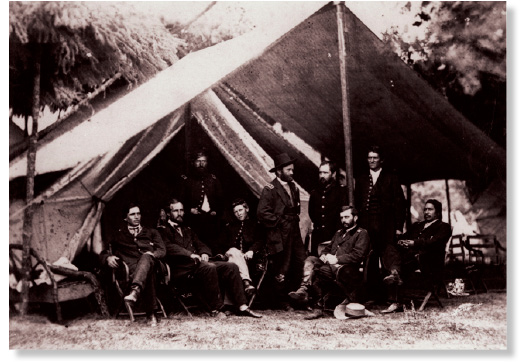Three Cheers for Young Grant!

Frederick Grant visited his father several times during the Civil War. He appears in this wartime photograph (seated to the left of Grant, who is standing, facing right).
General Ulysses S. Grant and his oldest son, Fred, watched from the gunboat Henry Von Ahul as the Union fleet steamed down the Mississippi River past Confederate batteries. Twelve-year-old Fred had begged to be allowed to accompany his father on the Vicksburg (Mississippi) Campaign. He was very excited.
Pitching In
Leaving Fred asleep on the boat, Grant went ashore the next morning to join his troops. When Fred woke up and realized his father was gone, he jumped ashore. Hoping to find the general, he joined a regiment marching to the front.
Instead, he found himself in the midst of the Battle of Port Gibson. When the fighting ended, Fred pitched in to help bury the dead and take the wounded to a house that was serving as a hospital. Exhausted, he finally fell asleep on the ground, where his amazed father later found him.
Mistaken Identity
Other battles soon followed. In the confusion after the Battle of Champion Hill, in Mississippi, a party of Union soldiers mistakenly tried to take Fred away as a prisoner. Luckily, an old soldier recognized the boy and yelled, “Three cheers for young Grant!” The red-faced soldiers released Fred and shouted heartily.
Once, as Fred watched retreating Confederates swim across the Big Black River, he was hit in the leg by an enemy sharpshooter. “I am killed,” Fred told the Union officer who rushed to his aid. When instructed to wiggle his toes, the boy obeyed and realized that the wound, while painful, was not serious.
Vicksburg Surrenders
During the siege of Vicksburg, Fred rested in his father’s tent. There, on the evening of July 3, a messenger brought a note to Grant. Grant read it, then quietly told Fred, “Vicksburg has surrendered.” A jubilant Fred rushed out to spread the good news to the troops.
The Battle of Vicksburg
Vicksburg, Mississippi, was known as “the Gibraltar of the Confederacy,” which meant that it was considered unconquerable. By the spring of 1863, it was one of the last Confederate-controlled cities along the Mississippi River. Both the North and the South recognized how valuable Vicksburg was. As President Abraham Lincoln said, “The war can never be brought to a close until that key [Vicksburg] is in our pocket.”
Vicksburg surrendered to Union forces on July 4, 1863. Although the Civil War continued for another 21 months, most historians agree that this battle and siege on the western front played a crucial role in sealing the fate of the Confederacy.
 Fast Fact: By the end of the war, more than 770 battles and skirmishes had taken place in Mississippi.
Fast Fact: By the end of the war, more than 770 battles and skirmishes had taken place in Mississippi.